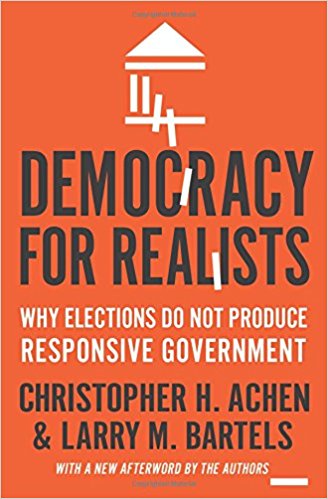Our political system is filled with messages about individual choice. Politicians claim to be representing the individual voter’s needs. Some political leaders will, in turn, rail against the parties, interest groups, and lobbyists that can all act as roadblocks between voters and their representatives. Election news coverage is similarly focused on voters’ decisions at the ballot box. Everything taps into the notion of individuality that runs through the American identity.
Except it turns out that this doesn’t describe individual voters’ behavior all that well. Individuals just don’t—and can’t—exert the kind of agency and control that they’re led to believe they possess. This yearning for individual exceptionalism is the subject of much scrutiny in the recent book by political scientists Chris Achen and Larry Bartels, Democracy for Realists. According to Achen and Bartels, voters really aren’t very good at holding elected officials accountable for their job performance. Voters have a hard time distinguishing good governing behavior from bad, and when they can do that, they do so on a very short time window. To the extent that voters judge presidents by the performance of the economy, they aren’t asking whether the state of the economy has improved over the past four years; they’re asking whether it’s improved over the past four months. Three-and-a-half pretty bad years can quickly be washed away by one late economic upswing. The governors, congresspeople, state legislators, and others who share the president’s party label will share some portion of his or her electoral fate, regardless of their own job performance.

(Photo: Princeton University Press)
On top of that, Achen and Bartels note, voters regularly assign credit or blame to politicians for things completely out of those leaders’ control. Voters punish their leaders for anything from economic slumps to shark attacks to storms to droughts, and they reward leaders for things like football victories.
Political scholar John Zaller spoke on this disconnect at a recent conference I attended on political parties. As he noted, many scholars and political observers are deeply concerned over voters’ commitment to democracy. But voters’ beliefs are only loosely related, at best, to government outcomes. As Zaller argued, we should be focusing on those entities that organize the demands of various groups and individuals and convert them into policies—that is, political parties.
In many ways, then, the health of our democracy depends upon the health of our parties. And how healthy are they?
That’s a difficult question to answer. Parties have demonstrated their ability to fly under the radar. Sure, people know parties exist, but they’re often unaware of the work parties are doing to organize politics—recruiting some candidates for primary elections while dissuading others, limiting policy options, narrowing and guiding public discussion of politics, and so forth. If voters want to cling to a polite fiction that they’re in control of their political destinies, perhaps there’s not much harm in that.
At the same time, reformers continue to seek ways to make parties’ jobs harder by, say, limiting how much money they can spend in elections, demanding that parties open up primary elections to non-party members, and driving party organization out of legislatures. Parties do a lot of the organizational work of democracy for us, and we’re doing a lot to undermine that. They’ve proven their creativity and adaptability in the past, but we’re working very hard to drive them out of politics, and voters seem happy to go along with the idea that parties are irrelevant and meddlesome.
Are parties doomed to be unpopular? Making the affirmative case for parties, and a compelling argument for why voters are not the center of the political universe, is not likely to be a politically successful task. As famed political scientists Robert Harmel and Ken Janda argued, voters are far from convinced that parties are important, but “it would be difficult to argue that anyone has seriously tried to persuade them.” Perhaps it’s time to make this very argument.





